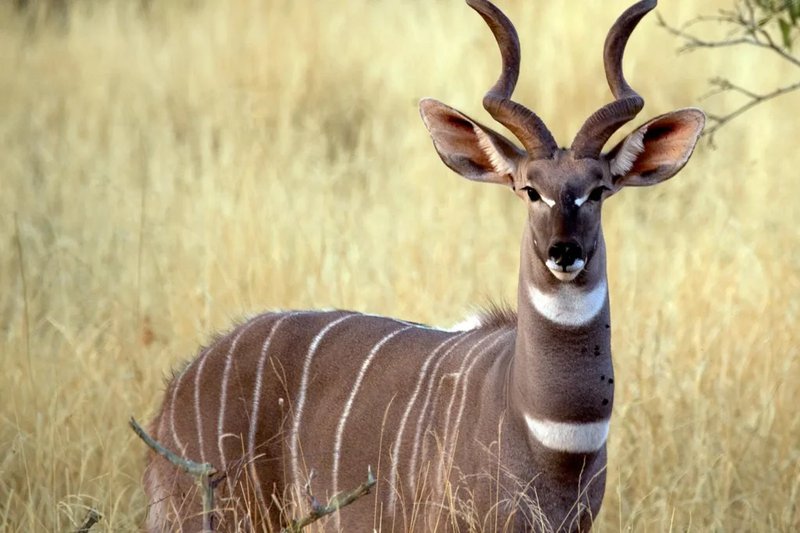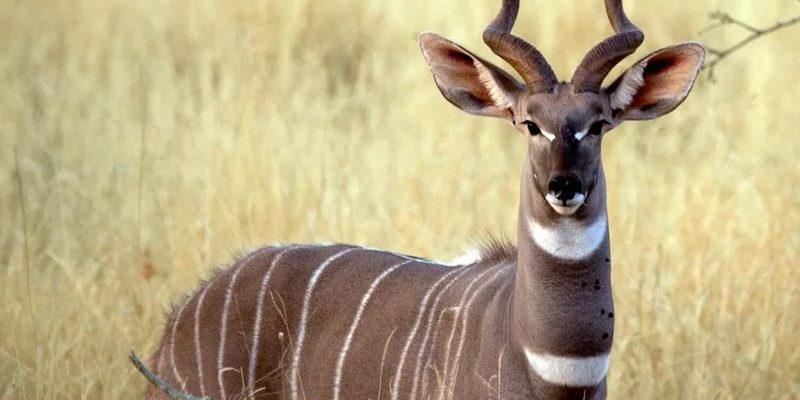
Understanding the intelligence of lesser kudus can be like peeling an onion. Each layer reveals something new about how they interact with their surroundings, each other, and their predators. Here’s the thing: their brains are not as big as those of some other species, but that doesn’t mean they lack smarts. In fact, their cognitive abilities are finely tuned to their specific lifestyle in the African savanna. So, let’s dive in and explore just how smart these lesser kudus really are.
What Is a Lesser Kudu?
Before we get into the nitty-gritty of their intelligence, let’s clear up what exactly a lesser kudu is. They’re medium-sized antelopes that inhabit the dense bush and woodlands of Eastern and Southern Africa. Lesser kudus are often overshadowed by their larger cousins, the greater kudus. But don’t let their smaller size fool you. They stand out with their striking coats—grayish-brown with white stripes—and those impressive spiral horns that can reach lengths of up to 36 inches in males.
These animals are typically shy and elusive, which can make observing their behavior quite a challenge. They prefer to stay hidden in the underbrush, where they can blend in and avoid predators. Lesser kudus are also known for their unique social structure, which often revolves around females and their young, while males tend to be more solitary. This social behavior can play a big role in how they interact and react to their environment, revealing layers of smart behavior worth exploring.
Understanding Their Environment
Lesser kudus are masters of their environment. Their habitat is full of challenges, from finding food to dodging predators like lions and hyenas. Their intelligence largely revolves around survival tactics. Spatial awareness is one of their strengths—they know the lay of the land and can navigate through dense vegetation with ease. Think of it like a built-in GPS system, allowing them to remember where the best food sources are and where to find shelter.
Here’s an interesting thought: these animals have excellent hearing and use their acute senses to detect danger. They often rely on their keen eyesight and sense of smell to alert them to threats long before they get too close. This instinct tells us that their cognitive abilities are finely tuned to ensure they can react quickly when needed.
Social Behavior and Communication
Lesser kudus may not be as vocal as some other animals, but they do communicate effectively. Their social behavior is often subtle but crucial for maintaining safety within their groups. They use a combination of body language and visual signals. For instance, the way a kudu stands or positions its ears can convey information to others about potential threats nearby.
You might be wondering how these social dynamics play out in the wild. Mothers are particularly attentive to their young, teaching them how to forage and what to watch for. This learning process shows that lesser kudus possess a level of social intelligence that helps them thrive. They learn from each other and from their experiences, passing down knowledge that aids survival.
Decision-Making Skills
Have you ever noticed how some animals seem to make decisions on the fly? Lesser kudus demonstrate impressive decision-making skills, especially when it comes to foraging. They need to constantly assess their surroundings, balancing the need for food with the risks of being exposed to predators.
Their foraging behavior is a great example of this. Lesser kudus are browsers, meaning they primarily eat leaves, shoots, and shrubs. They weigh their options and choose food sources that offer the best nutritional value while considering the level of exposure to potential threats. This ability to evaluate risks indicates a cognitive capacity that enhances their survival.
Memory and Learning
Another fascinating aspect of lesser kudu intelligence is their memory. These animals are capable of remembering specific locations of food and water sources over long periods. Picture this: a kudu finds a particularly tasty patch of leaves. Because they return to it regularly, they form a mental map of their territory that helps them navigate effectively.
This impressive memory serves not just for food but also for recognizing both friendly and threatening animals in their environment. When a kudu encounters a predator and escapes, it remembers that experience. This learning process helps them avoid danger in the future, showcasing their cognitive adaptability.
How Lesser Kudus Use Their Intelligence to Cope
In the wild, adaptability is key for survival. Lesser kudus demonstrate intelligence through their ability to cope with changing environments. For instance, when facing food scarcity during dry seasons, they adjust their foraging habits, exploring new areas in search of sustenance. This flexibility in behavior shows that they can learn and adapt based on their experiences.
Moreover, their intelligence helps them respond to shifts in the social structure of their groups. If a dominant male is removed or a new threat emerges, lesser kudus can adjust their social dynamics accordingly, forming new bonds or changing their movement patterns to ensure safety. Their cognitive abilities are intertwined with their survival strategies.
So, how smart really is a lesser kudu? While they might not top the charts like dolphins or elephants, their cognitive abilities are impressive in their own right. From navigating their habitat with expert spatial awareness to displaying social intelligence through communication, lesser kudus have adapted their behaviors to thrive in challenging environments.
These animals show us that intelligence comes in many forms. It’s not always about having the largest brain or the most complex tools. For lesser kudus, it’s about using their skills to survive and flourish in the bush. In the end, whether you’re watching them blend into the underbrush or gracefully navigating their environment, there’s no denying that these antelopes embody a unique kind of smart that deserves our appreciation.

